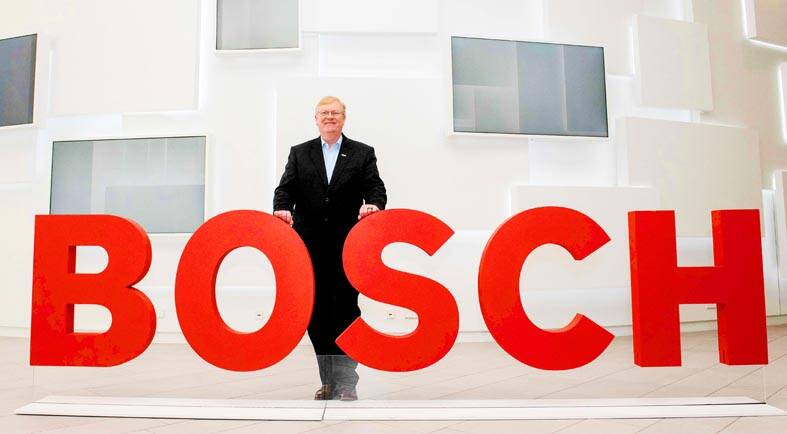The US Department of Commerce on Friday said that it had reached a preliminary deal with German auto supplier Bosch for up to US$225 million in subsidies to build silicon carbide (SiC) power semiconductors, a key component in electric vehicles (EVs), in California.
The department said the funding would support Bosch’s planned US$1.9 billion investment to transform its manufacturing facility in Roseville, California for production of SiC power semiconductors. It is also offering Bosch approximately US$350 million in proposed government loans for the project.
The department is tapping the US$52.7 billion fund, approved in 2022, to subsidize US semiconductor production and research. Officials have been racing to finalize terms for major loans in the weeks before President-elect Donald Trump takes office.

Photo: AFP
Bosch expects to produce its first chips on 200mm wafers in its Roseville facility starting in 2026. SiC chips are key components for the automotive, telecommunications and defense industries. They utilize less energy and are critical for boosting the efficiency of EV driving and charging, it said.
Last year, Bosch acquired key assets of California-based TSI Semiconductors and said producing the chip would “be heavily dependent on federal funding opportunities.”
Like other automotive manufacturers, Bosch was hit hard by disruptions to semiconductor production in Asia, which were exacerbated by the COVID-19 pandemic.
In October, the department reached a preliminary agreement with Wolfspeed for US$750 million in grants for its new SiC wafer manufacturing plant facility in North Carolina, it said.
When the Bosch facility reaches full capacity, the project could comprise more than 40 percent of all US-based SiC device manufacturing capacity, it added.
“The Roseville investment enables Bosch to locally produce silicon carbide semiconductors, supporting US consumers on the path to electrification,” Bosch North America president Paul Thomas said in a statement.
The award to Bosch would allow them to build “essential components for advances in clean mobility, electric vehicles and other clean energy technology,” said US Representative Doris Matsui, a California Democrat who helped write the 2022 law.

Nvidia Corp chief executive officer Jensen Huang (黃仁勳) on Monday introduced the company’s latest supercomputer platform, featuring six new chips made by Taiwan Semiconductor Manufacturing Co (TSMC, 台積電), saying that it is now “in full production.” “If Vera Rubin is going to be in time for this year, it must be in production by now, and so, today I can tell you that Vera Rubin is in full production,” Huang said during his keynote speech at CES in Las Vegas. The rollout of six concurrent chips for Vera Rubin — the company’s next-generation artificial intelligence (AI) computing platform — marks a strategic

REVENUE PERFORMANCE: Cloud and network products, and electronic components saw strong increases, while smart consumer electronics and computing products fell Hon Hai Precision Industry Co (鴻海精密) yesterday posted 26.51 percent quarterly growth in revenue for last quarter to NT$2.6 trillion (US$82.44 billion), the strongest on record for the period and above expectations, but the company forecast a slight revenue dip this quarter due to seasonal factors. On an annual basis, revenue last quarter grew 22.07 percent, the company said. Analysts on average estimated about NT$2.4 trillion increase. Hon Hai, which assembles servers for Nvidia Corp and iPhones for Apple Inc, is expanding its capacity in the US, adding artificial intelligence (AI) server production in Wisconsin and Texas, where it operates established campuses. This

US President Donald Trump on Friday blocked US photonics firm HieFo Corp’s US$3 million acquisition of assets in New Jersey-based aerospace and defense specialist Emcore Corp, citing national security and China-related concerns. In an order released by the White House, Trump said HieFo was “controlled by a citizen of the People’s Republic of China” and that its 2024 acquisition of Emcore’s businesses led the US president to believe that it might “take action that threatens to impair the national security of the United States.” The order did not name the person or detail Trump’s concerns. “The Transaction is hereby prohibited,”

Garment maker Makalot Industrial Co (聚陽) yesterday reported lower-than-expected fourth-quarter revenue of NT$7.93 billion (US$251.44 million), down 9.48 percent from NT$8.76 billion a year earlier. On a quarterly basis, revenue fell 10.83 percent from NT$8.89 billion, company data showed. The figure was also lower than market expectations of NT$8.05 billion, according to data compiled by Yuanta Securities Investment and Consulting Co (元大投顧), which had projected NT$8.22 billion. Makalot’s revenue this quarter would likely increase by a mid-teens percentage as the industry is entering its high season, Yuanta said. Overall, Makalot’s revenue last year totaled NT$34.43 billion, down 3.08 percent from its record NT$35.52